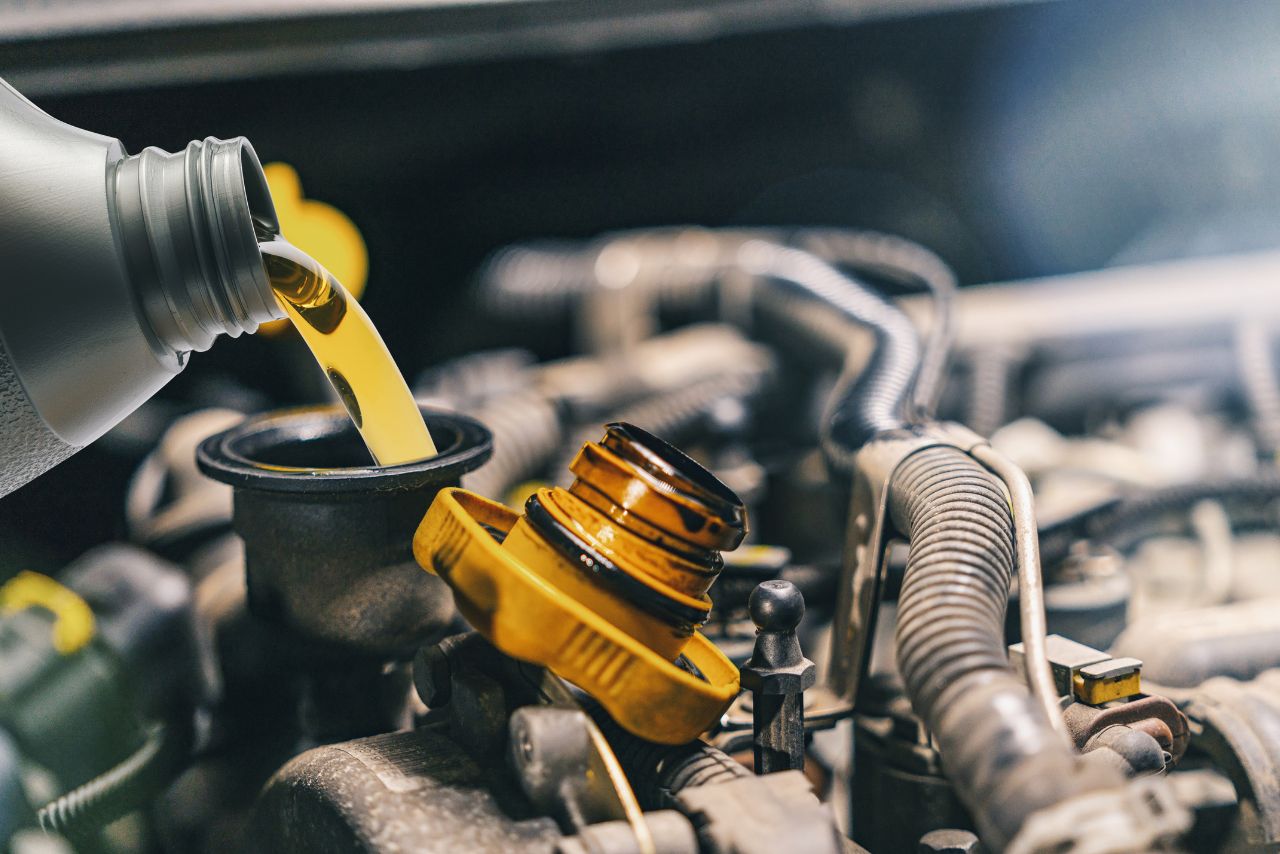Do you ever wonder how engine oil affects the temperature of your car’s engine? The answer is more complicated than a simple yes or no. Engine temperature is a crucial factor in the performance and longevity of your vehicle.
Understanding the relationship between engine oil and temperature can help you make informed decisions about choosing the right oil for your car and maintaining its optimal performance.
In this article, we will explore the different types of engine oil, their viscosity, and how Does Oil Affect Engine Temperature?
We will also discuss the role of temperature-regulating additives in engine oil and common misconceptions about oil and engine temperature.
By the end of this article, you will have a better understanding of how engine oil affects engine temperature and how to maintain your car’s performance and longevity.
The answer is Yes, Oil significantly affects engine temperature by serving as a lubricant, coolant, and heat transfer medium. It absorbs heat from engine components and carries it away for dissipation, while also reducing friction to prevent excessive heat generation.
Proper oil viscosity and quality, along with a well-maintained cooling system, are essential for maintaining optimal engine temperature.
Table of contents
Understanding Engine Temperature:
You’ll notice that your engine temperature gauge will start to rise as you drive, indicating how hot your engine is getting.
This is because your engine generates a lot of heat as it runs, and the temperature gauge is there to let you know if your engine is getting too hot.
Factors affecting engine temperature include the speed you’re driving, the load you’re carrying, the outside temperature, and the condition of your cooling system.
It’s important to monitor your engine temperature, as an overheated engine can cause serious damage. If your engine gets too hot, it can warp or crack the cylinder head, damage the pistons, or even seize up completely.
This can be expensive to repair, and in some cases, may require you to replace the entire engine.
By keeping an eye on your engine temperature gauge and addressing any issues that arise, you can help ensure that your engine stays in good condition and runs smoothly for years to come.
Types of Engine Oil:
Here’s a recommended engine oil:
- Better fuel economy – compared to 15W-40 oils Rotella offers enhanced fuel economy capability of 1.5% without compromising engine protection or durability
- Improved wear performance – provides a significantly increased level of protection against harmful engine wear when compared to previous generation API CJ-4 engine oils
- Improved deposit control – advanced multi-functional dispersant additives in combination with synthetic base oils provide an enhanced level of protection against the effects of soot, dirt and other contaminants
- Emissions system compatibility – advanced low-ash formulation helps control blocking of or poisoning of exhaust after-treatment devices, helping maintain vehicle emission compliance and engine fuel efficiency
- Improved heat resistance – resists breakdown by heat to provide continuous protection throughout the service interval
There’s a wide variety of engine oil types available on the market, each with its own unique set of properties and benefits.
The type of engine oil you choose can have a significant impact on your engine’s performance and longevity.
In general, engine oils are classified based on their viscosity, which is a measure of the oil’s resistance to flow at different temperatures.
The table below provides an overview of the most common types of engine oil and their properties:
| Oil Type | Viscosity | Benefits |
|---|---|---|
| Conventional | Thicker | Affordable, widely available |
| Synthetic | Thinner | Better engine lubrication, longer lasting |
| High Mileage | Thicker | Helps reduce oil leaks, extends engine life |
| Racing | Thinner | Provides maximum engine performance and protection |
Choosing the right engine oil type for your vehicle depends on a variety of factors, such as your driving style, the age of your engine, and the climate where you operate your vehicle.
Regardless of the type of oil you choose, it’s important to ensure that your engine is properly lubricated to prevent damage and keep it running smoothly.
How Low Oil Levels Can Cause Your Car To Overheat?
Insufficient oil levels can lead to overheating in your car due to various reasons. Firstly, oil serves as a lubricant, reducing friction between moving parts and preventing excessive heat buildup.
When oil levels are low, friction increases, generating more heat and potentially causing engine overheating.
Secondly, oil also helps in dissipating heat by absorbing it from engine components. Inadequate oil levels result in reduced heat absorption and poor heat transfer, contributing to overheating.
Additionally, low oil levels can affect the proper functioning of the cooling system, as oil assists in lubricating the water pump and facilitating coolant flow.
Therefore, maintaining appropriate oil levels is crucial to prevent overheating and ensure optimal engine performance.
Can an oil change affect overheating?
The Answer is Yes, an oil change can potentially affect overheating. Fresh oil with the correct viscosity and quality improves lubrication, reduces friction, and promotes efficient heat transfer.
Regular oil changes help maintain proper engine temperature by preventing excessive heat buildup, ensuring optimal engine performance, and reducing the risk of overheating.
Viscosity and Engine Temperature:
To maintain optimal performance, it’s crucial to consider the impact of oil viscosity on your engine’s temperature.
Viscosity refers to the oil’s thickness or resistance to flow. It plays a crucial role in engine efficiency and temperature regulation.
If the oil is too thick, it won’t flow easily through the engine, causing it to work harder and generate more heat. On the other hand, if the oil is too thin, it won’t provide sufficient lubrication, leading to increased friction and heat.
As the engine heats up, the oil viscosity decreases, allowing it to flow more freely throughout the engine. This is why it’s essential to choose an oil with the right viscosity, one that can maintain its properties even at high temperatures.
The ideal oil viscosity can vary depending on the engine type and manufacturer’s recommendations. However, it’s generally recommended to use a multi-grade oil, which can provide optimal performance in both hot and cold conditions.
Thicker Oil and Engine Temperature:
Using a more viscous lubricant can have a significant impact on how efficiently your vehicle’s motor runs. Thicker oil can provide better lubrication properties, which can help protect engine components and reduce wear and tear.
However, it can also affect engine temperature, as the thicker oil takes longer to flow through the engine and may not cool it down as quickly as a thinner oil would.
To better understand the impact of oil viscosity on engine temperature, the following table provides a comparison of the different oil grades and their corresponding temperature ranges:
| Oil Grade | Temperature Range |
|---|---|
| 0W-20 | -40°C to 35°C |
| 5W-20 | -35°C to 40°C |
| 5W-30 | -30°C to 40°C |
| 10W-30 | -15°C to 40°C |
| 10W-40 | -10°C to 40°C |
As you can see, the lower the oil grade, the better it performs in colder temperatures. However, it also means that the oil is thinner and may not provide the same level of protection in hotter temperatures.
On the other hand, a higher oil grade may provide better protection in hot temperatures but may not flow as easily in cold temperatures. It’s important to choose the right oil viscosity for your vehicle’s specific needs to ensure optimal performance and protection.
Thinner Oil and Engine Temperature:

If you’re driving in a scorching hot climate, opting for a thinner lubricant can help keep your vehicle’s motor cool and running smoothly.
Oil viscosity plays a crucial role in engine lubrication, and a thinner oil flows through the engine quicker, providing faster lubrication to the engine parts.
Thinner oil also generates less friction and reduces the heat generated by the engine, offsetting the effects of high ambient temperatures.
However, it’s essential to note that thinner oil does have its limitations. It can break down quicker than thicker oil, reducing its lubricating properties and leaving engine parts susceptible to wear and damage.
Therefore, it’s crucial to consult the manufacturer’s recommendations before switching to a thinner oil. In some cases, a thicker oil may be necessary to provide adequate lubrication and protect the engine from extreme heat.
Temperature-Regulating Additives:
In this subtopic, you’ll learn about temperature-regulating additives and how they affect your engine’s temperature.
There are various types of additives that can be used, each with its own unique benefits and drawbacks.
By understanding these additives and how they work, you can make an informed decision on which one to use for your specific engine needs.
Types of Additives that Regulate Temperature:
One effective way to regulate engine temperature is by incorporating temperature-controlling additives.
These additives are designed to improve the performance of the engine by reducing the amount of heat generated during operation.
There are different types of additives that can be used to regulate engine temperature, including coolant additives, oil additives, and fuel additives.
Coolant additives are designed to improve the performance of the engine’s cooling system. They help to prevent the buildup of rust and corrosion in the cooling system, which can lead to overheating and engine damage.
Oil additives, on the other hand, are designed to improve the performance of the engine’s lubrication system. They help to reduce friction and wear, which can lead to overheating and engine failure.
Fuel additives are designed to improve the performance of the engine’s fuel system. They help to improve fuel efficiency and reduce emissions, which can help to reduce the amount of heat generated during operation.
Incorporating these additives into your engine can provide a range of benefits, including improved engine longevity and reduced maintenance costs.
How Additives Affect Engine Temperature?
Using additives can significantly impact the way your engine regulates its temperature, improving its overall performance and reducing the risk of damage.
Oil additives, in particular, can help reduce engine temperature by improving the oil’s ability to absorb and dissipate heat.
This is achieved through the addition of certain chemicals that enhance the oil’s thermal conductivity and help it maintain its viscosity even at high temperatures.
Performance testing has shown that oil additives can improve engine temperature regulation by up to 10°C. This is because they help the engine maintain a more consistent temperature, which reduces the risk of overheating and damage to engine components.
Additionally, some oil additives can help prevent the buildup of deposits and other contaminants that can clog the engine’s cooling system, further improving its ability to regulate temperature.
Overall, using oil additives can be an effective way to improve your engine’s performance and reduce the risk of costly repairs.
Testing Oil Performance:

When evaluating oil performance, it’s like testing a superhero’s powers before sending them into battle – you want to make sure they can handle the heat and pressure without breaking down.
- Oil performance testing methods are designed to measure an oil’s ability to withstand high temperatures and pressures, and to resist degradation over time. These tests are critical because they help determine whether an oil is suitable for use in an engine, and how long it will last before needing to be changed.
- One of the key factors that affects engine temperature is oil degradation. As oil breaks down over time, it becomes less effective at lubricating engine parts, which can cause increased friction and heat. This can lead to overheating, which in turn can cause damage to engine components.
- By testing oil performance, engineers can identify oils that are more resistant to degradation, and therefore better suited for use in high-performance engines that generate a lot of heat and pressure.
Best Practices for Maintaining Engine Temperature:
- And API service classification including Catepillar, Cummins, Detroit Diesel, Mack, Navistar and more
- Made in : United States
- Package weight: 7.85 lbs
- Product type: AUTO OIL
Maintaining optimal temperature levels in an engine can be achieved through implementing effective maintenance practices.
- One of the key aspects of maintaining engine temperature is keeping the engine cooling system in good condition.
- The radiator is a critical component of the engine cooling system, and it’s important to ensure that it’s functioning properly.
- Regular radiator maintenance can help prevent overheating and other issues related to engine temperature.
- This includes checking the radiator for leaks, ensuring that the coolant level is sufficient, and inspecting the radiator hoses for signs of wear and tear.
- Another important aspect of maintaining engine temperature is ensuring that the engine oil is at the correct level and is changed regularly.
- Engine oil plays a critical role in regulating engine temperature by lubricating parts and reducing friction.
- Over time, engine oil can become contaminated with dirt and debris, which can hinder its ability to regulate engine temperature.
It’s important to follow the manufacturer’s recommended oil change schedule and use the correct type of oil for your engine.
By following these best practices for maintaining engine temperature, you can help ensure that your engine runs smoothly and efficiently.
Common Misconceptions about Oil and Engine Temperature:
You may have heard some misconceptions about how the type of oil you use affects your engine’s ability to handle high temperatures.
One common myth is that using thicker oil will reduce engine temperature. However, this is not necessarily true.
While thicker oil may be able to withstand higher temperatures, it can also decrease the flow of oil to important engine components. This can actually lead to an increase in engine temperature and cause damage over time.
Another misconception is that synthetic oil is always better for high temperature situations.
While synthetic oil does have some advantages, such as better resistance to breakdown at high temperatures, it is not always necessary for every engine.
It’s important to choose the correct grade and viscosity of oil for your specific engine, as recommended by the manufacturer.
Proper oil maintenance, such as regular changes and using the correct oil, can help to ensure proper engine heat management.
Frequently Asked Questions:
What are the main causes of engine overheating besides the type of oil used?
“Overheating occurs when a clogged radiator or malfunctioning thermostat prevent proper coolant flow. While oil type can impact engine performance, these issues are independent of it. Addressing them promptly can prevent costly engine damage.” ‘It is important to regularly check and maintain your vehicle’s cooling system to avoid the risk of overheating.’
Can using thicker oil actually harm an engine’s performance in certain conditions?
You may have heard thicker oil myths, but in reality, using a thicker oil can harm engine performance in certain conditions. Synthetic oil can offer better protection, and some oil additives can improve engine performance.
Are there any DIY methods for testing an engine’s temperature-regulating capabilities?
You can test your engine’s temperature-regulating capabilities with DIY temperature sensors. Engine coolant additives can also help regulate temperature. Symbolically speaking, don’t let your engine overheat. Technical precision is key.
Is it necessary to change oil viscosity based on seasonal changes in temperature?
To choose the right oil for your vehicle based on usage, consider oil viscosity debates and consult your owner’s manual. Changing oil viscosity based on seasonal changes in temperature may be necessary for optimal engine performance.
What are some common signs that an engine is running too hot and needs attention?
Is your engine running too hot? Look out for signs like steam or smoke coming from under the hood, a high-pitched whine, or a dashboard warning light. These may indicate issues with coolant leaks or a faulty thermostat that require immediate attention.
Conclusion and final thoughts 💭
Congratulations, you now have a better understanding of how engine oil affects engine temperature.
Remember, engine temperature is crucial for optimal engine performance and longevity.
Using the right type of oil with the appropriate viscosity and temperature-regulating additives is key to maintaining a healthy engine temperature.
Did you know that according to a study by AAA, driving with low levels of engine oil can increase engine temperature by up to 50 degrees Fahrenheit?
This can lead to costly engine damage and repairs. It’s important to regularly check and maintain proper oil levels to ensure your engine is running at its best.
In conclusion, taking care of your engine temperature starts with choosing the right type of oil and maintaining proper oil levels.
By following best practices and avoiding common misconceptions about oil and engine temperature, you can help ensure a safe and efficient driving experience for years to come.





Leave a Reply